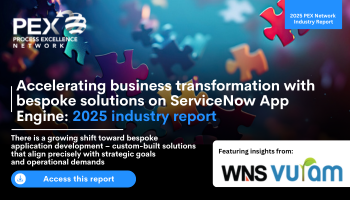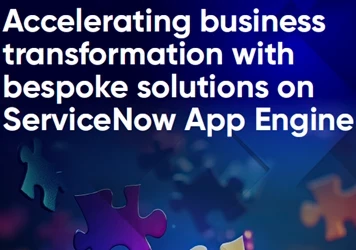11 ways to achieve operational excellence in 2023
A definitive list of the major trends and critical considerations process excellence professionals should have in mind when driving continuous improvement this year
Add bookmark
PEX Network shares the 11 best strategies for achieving operational excellence in 2023 including transformational mindset strategies, cutting-edge technologies and proven process excellence methodologies.
Featuring highlights from our flagship PEX Report 2023, we shed light on some of the leading ways OPEX leaders can overcome the year’s most pressing challenges, such as inflation, skilled talent shortages and budget limitations, and continue to deliver transformational results.
Join the PEX Network community

Don't miss any news, updates or insider tips from PEX Network by getting them delivered to your inbox. Sign up to our newsletter and join our community of experts.
Learn MoreContents:
- Target transformations to deliver tangible results
- Embrace holistic enterprise solutions to deliver big results
- Lean into automation and data insights, but recognize their limitations
- Expand your focus beyond EX and CX to encompass the total experience (TX)
- Accelerate transformation with a process center of excellence
- Drive continuous innovation with digital twins
- The key to quick operational excellence wins is agile
- Unlock the power of the citizen developers with low code
- Embed operational excellence into organizational culture
- Align OPEX goals with business strategy
- Make data governance the foundation of operational excellence
Target transformations to deliver tangible results
A staggering 70 percent of operational excellence efforts fail, according to a report from McKinsey. While failure is an essential component of success, in 2023, many organizations will opt to fail fast and often but with lower stakes.
One of the biggest surprises we uncovered in PEX Report 2023 was that organizations appeared to be moving away from enterprise-level transformation efforts and toward more business-unit specific projects. In fact, while 44 percent of respondents in 2022 stated they were conducting enterprise-wide transformation, only 35 percent planned to do the same in 2023.
After two years of urgent, large-scale, pandemic-driven transformation, it makes sense that organizations might want to take a step back. As Maneesh Subherwal, executive director of business transformation – commercial bank at JPMorgan stated in the report: “People are tired – it is yet another transformation we talk about. Targeted transformation leads to outcomes as opposed to doing it in a ‘big bang’ way where you are not clear what you are shooting for.”
Given that 2023 is poised to be a “wild ride,” choosing to focus on operational excellence projects that are small in scope but deliver outsized results should prove prudent.
Embrace holistic enterprise solutions to deliver big results
Organizations may be narrowing the scope of transformational projects, but they continue to invest in holistic solutions.
Organizations are moving away from targeted solutions such as robotic process automation (RPA). Instead they are embracing enterprise solutions such as digital transformation platforms and BI/data analytics tools. To elaborate, while 41 percent and 33 percent of respondents to the PEX Report 2023 survey said they plan to leverage digital transformation platforms and BI/data analytics tools, respectively, in 2023, less than half of that number (15 percent) plan to utilize RPA.
As holistic, enterprise-level solutions are designed to be scaled across multiple functions and business units, they tend to deliver more business value in terms of direct ROI. By centralizing work into one centralized system, these tools allow users to innovate faster and more reliably than more targeted solutions, a must for thriving in an increasingly competitive economic environment.
Lean into automation and data insights, but recognize their limitations
Automation and data analytics have long been the lifeblood of operational excellence. This year, given the various workforce constraints and economic pressures companies are facing, organizations will need to embrace technology like never before.
Nadeem Saeed, corporate vice-president, quality excellence at Verizon, recently commented “[In 2023] there will be a focus on hyper technology to solve operational problems. Due to economic trends, a focus on cost and speed will be immense.”
Kim Getgen, CEO of InnovationForce, elaborated on the value of automation in the current global business climate: “Process automation allows innovators to accelerate the tasks that lead to a decision point faster. It allows innovators to share their workload across more people responsible for microtasks that can be worked in parallel.
“Innovation performance data can be captured from workflows and analyzed to help organizations better predict and forecast the outcomes of their innovation programs. Automated process, dashboard reporting and data allow people to spend less time in the menial tasks and more time in the growth potential of their work.”
 Automation and data analytics are vital enablers of operational excellence, but organizations can go overboard. Too much data can be just as useless as too little. Over-automating and over-engineering processes can increase inefficiencies. The key is finding balance between the human and technological elements.
Automation and data analytics are vital enablers of operational excellence, but organizations can go overboard. Too much data can be just as useless as too little. Over-automating and over-engineering processes can increase inefficiencies. The key is finding balance between the human and technological elements.
“Innovation is still very much a human interactive team sport – and it always will be,” notes Getgen. “All of the AI in the world will not replace the human factor in the innovation process. At the core, we still must rely on humans’ judgment and business acumen. Focus on having just the right amount of data and process to drive rapid learning and experimentation (fast!). Organizations that have a rapid and repeatable culture of experimentation and learning create the DNA to outperform their competition and can create a discernible advantage in their industries.”
Expand your focus beyond EX and CX to encompass the total experience (TX)
OPEX leaders take heed, according to Gartner, organizations adhering to a total experience (TX) strategy will outperform their competitors by 25 percent in satisfaction metrics for CX and EX by 2024. They also noted that 60 percent of large organizations will use TX “transform their business models to achieve world-class customer and employee advocacy levels” by 2026.
One company that’s already ahead of the curve on this Ikea. As Barbara Martin Coppola, chief digital officer at IKEA Group, explained in a 2021 Capgemini report: “Our digital transformation is about embracing a digital DNA in all aspects: digital touch points for customers, internal solutions for co-workers, and embedding digital in our ways of working – which is agile, cross-functional and collaborative. We have been making big improvements using digital in e-commerce and fulfillment across our various countries.”
“We have embarked on this journey toward digital and are working on our technology landscape, architecture, structure and skill sets so we can deliver at the required speed,” Coppola adds.
One recent TX project the company has been working on involves overhauling its financial systems and using insights derived from possess mining to optimize its order-to-cash processes and elevate the customer experience. As part of this strategy, Ikea created a new multifaceted metric dubbed “the perfect order”. In a recent interview with diginomica, Tim Hills, process and data insight development manager at INGKA Group, explained: “In order to realize value, we need to be able to measure where we are, measure where we want to be and figure out how to get there. The metric we are looking at is our ‘perfect order’.
“The perfect order is flawlessly taking and fulfilling the customer order – take the order correctly, allocate inventory and deliver the product with an accurate invoice. We’ve got internal and external benchmarking,” Hills remarked.
Accelerate transformation with a process center of excellence
Organizations all across the world and industry spectrum are grappling with a talent shortage of historic proportions. A global study conducted by ManPowerGroup found that 75 percent of companies reported talent shortages and difficulty hiring in 2022.
The future does not appear to be brighter. A landmark study by KornFerry predicts the global talent shortage will grow by 85 million people (roughly equivalent to the population of Germany) by 2030 potentially resulting in about US$8.5 trillion in unrealized annual revenues.
A center of excellence (CoE) can help companies overcome talent shortages by centralizing process and operational excellence workers into one, enterprise-level team. This allows knowledge, resources and innovative ideas to be disseminated more efficiently.
In the PEX Report 2023, Nintex CEO Eric Johnson summarized why process CoEs are essential to success in 2023. “While process CoEs have always been sources of significant value in companies, their strategic value has soared over the past few years as companies in every industry have had to adapt, change and evolve more dramatically and more quickly than ever before,” Johnson stated.
“Without a process CoE and the culture of operational excellence it can cultivate, you run the risk of being unable to remain relevant and valuable to your customers. These days, that is a dangerous risk to take.”
Drive continuous innovation with digital twins
Due to recent advancements in enabling technology such as IoT, AI and the metaverse, digital twins are going mainstream. From helping organizations reimagine their post-Covid workplaces to optimizing semiconductor manufacturing processes to strengthening supply chains, digital twins are poised to be one of the most widely adopted and talked about operational excellence strategies.
In fact, industry analysts predict that the digital twin market will grow at a CAGR of 37.5 percent from 2023 to 2030.
According to the experts at McKinsey, organizations that successfully leverage digital twin technology in 2023 will gain significant competitive advantage. As stated in a recent report on the topic, Digital twins: The foundation of the enterprise metaverse, “sufficient technology and know-how exist to build digital twins today, and doing so creates significant value now rather than taking years”.
The report goes on to describe how one company built a digital twin of its network assets that allowed it to “optimize capital spending, regulate usage patterns, identify failure points, and automatically initiate digital interventions based on unique network insights.” As a result, the company was able to reduce its capital and operating expenses by 10 percent. Looking forward, the company predicts that its digital twins will deliver billions of dollars in cumulative financial impact over the next decade.

The key to quick operational excellence wins is agile
As effective as traditional process excellence strategies are, they are anything but quick fixes. In a year where companies will be pressured to innovate fast, many are embracing an agile approach to process excellence.
Out of the 35 methodologies and solutions inquired about in the PEX Report 2023, agile emerged as the top choice for respondents with 35 percent stating they were leveraging this approach at time of press. An additional 27 percent said that “agile transformation” was a top priority for 2023.
Nao Anthony, a PEX Network advisory board member and senior manager of operational excellence at Commonwealth Bank, shared his thoughts on why agile is so well suited to our times.
“Agile helps companies adapt to the faster world we live in,” Anthony remarked. “The reality is that today companies can no longer wait that long as they want transformation to happen straight away.”
Incremental and iterative by design, agile enables organizations to deliver value almost immediately. Instead of presenting customers with a final end-product, agile emphasizes customer involvement throughout the development cycle.
“It helps companies to reach customers faster and fail fast in instances, saving millions of dollars and most importantly addressing potentially dissatisfied customers,” Nao added.
Unlock the power of the citizen developers with low code
One of the most potent ways companies can combat the IT talent shortage is through the use of low-code and no-code tools. By eliminating (or at least significantly reducing) the coding required to build applications and automations, low-code tools help experienced developers build products faster. More ambitious organizations will opt to take things one step further by equipping non-technical employees with low code tools so they can build products on their own with minimal help from IT.
In the hands of process and operational excellence professionals, many of whom already have strong engineering backgrounds, low-code automation tools have proven to be a potent enabler of increased innovation and performance.
For example, Dimitris Papanikolopoulos, service technology leader at 3M, explained in a 2022 interview with PEX Network: “One of the biggest successes we have experienced at 3M is the implementation of the citizen development model by creating a framework called Automation Power Users (APU). We are educating our operations employees on low-code and no-code technologies to enable them to develop their own solutions and experiment.”
“We want to empower our operations teams to deliver low and medium complexity initiatives and utilize the global developer pipeline only for complicated and global initiatives. Through citizen development we can achieve substantial automation to help operations automate their processes and perform better,” Papanikolopoulos added.
Embed operational excellence into organizational culture
In a 2019 study on the link between organizational culture and operational excellence, researchers from University of Minho (Portugal) and the Massachusetts Institute of Technology (US) argued that operational excellence “should not be considered in the short term as simply a program or set of tools, or as another management fad”.
Instead, operational excellence should be regarded as a set of guiding principles that promote continuous improvement, inspire innovation and enhance decision-making. These concepts and values should be so deeply embedded into organizational culture that people do not have to think about them, they become the norm.
When it comes to cultivating a culture of excellence in 2023, there is certainly no one-size-fits-all approach. While some organizations may embrace kaizen, others may achieve results through innovation workshops, empowering employees to drive operational excellence on their own will be paramount to success in 2023.
Align OPEX goals with business strategy
“Operational excellence is a mindset that requires constant focus on business priorities,” Alcon operational and process excellence director Luis Estrada advised in a recent interview. “The goal is to align the OPEX capabilities and resources rapidly to those priorities and to continue developing our culture of continuous improvement.”
In 2023 it will be especially important to ensure that OPEX strategies align with larger business goals and objectives as there may be increased internal competition for resources, talent, budget and other resources. Keeping OPEX strategies tightly aligned with business priorities will help ensure the buy-it necessary to enable long-term transformation.
Make data governance the foundation of operational excellence
Ahead of this year’s World Economic Forum's annual meeting in Davos, Barbara Frei, executive vice-president and chief executive officer – industrial automation at Schneider Electric, asked in a column on Industry 4.0, “Imagine how much more could be achieved by standardizing data exchange between IT systems such as software for enterprise resource planning (ERP) and the operational technology on the shop floor. Or by orchestrating a fully interconnected ecosystem of suppliers and partners, accessing orders and inventories spread across multiple facilities to improve planning, quality and anticipate risk.”
But, she added, achieving these objectives “requires applying a clear digital technology roadmap, underpinned by governance around data standardization and cybersecurity strategies”.
According to the PEX Report 2023, 33 percent of OPEX leaders surveyed plan to invest in BI/analytics and 31 percent in AI over the next 12 months. Statistically speaking, 70–80 percent (see here and here) will likely fail.
In 2023, organizations that invest in data governance will have a leg up when it comes to successfully implementing automation, advanced analytics and other technologies that require steady streams of high quality, structured enterprise data. Looking beyond the next 12 months, data governance will take on even more importance as these technologies go mainstream.
Although data governance has not traditionally fallen under the OPEX umbrella, the proliferation of data-driven technology has democratized data governance, making it a priority for all stakeholders.
What are some other ways OPEX leaders can achieve success in 2023? Share your thoughts in the comments section below.
Today, off-the-shelf software solutions offer diverse features that enable vast opportunities to implement and maintain business transformation. However, in some circumstances, capabilities lack the flexibility and specificity required to address the unique challenges and workflows of individual organizations. As a result, there is a growing shift toward bespoke application development – custom-built solutions that align precisely with strategic goals and operational demands. Download this report to explore how enterprises can harness the power of custom applications to drive meaningful transformation. With the growing adoption of low-code platforms like ServiceNow App Engine, organizations are building custom applications faster and with greater control. By empowering both IT professionals and citizen developers to build tailored solutions, organizations can significantly reduce time to value while maintaining control over quality and compliance.Accelerating business transformation with bespoke solutions on ServiceNow App Engine
























